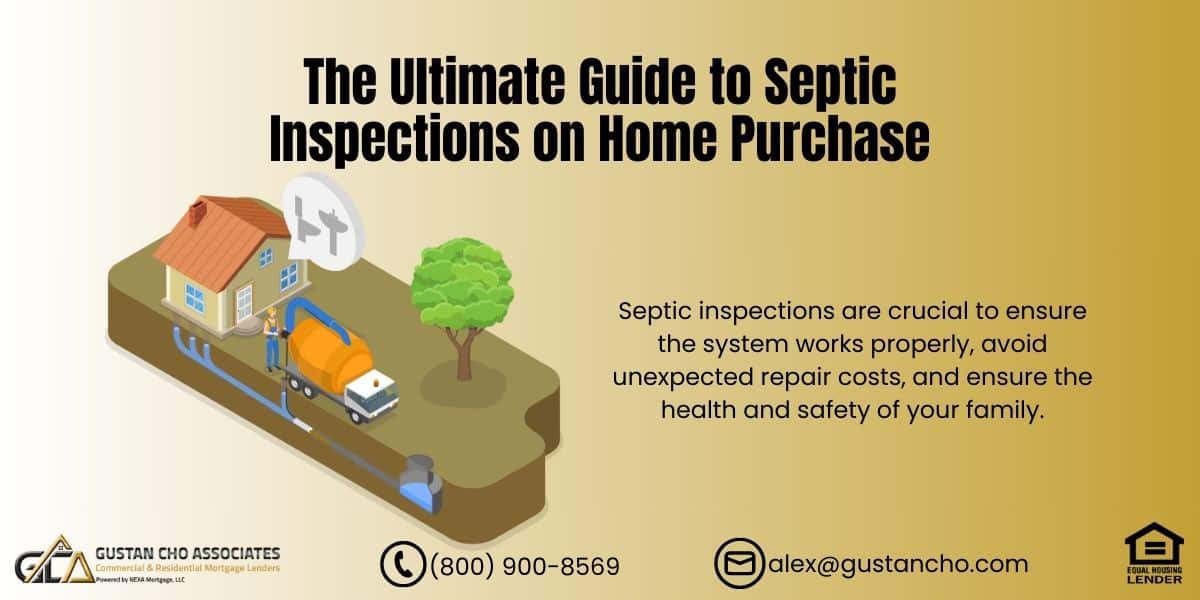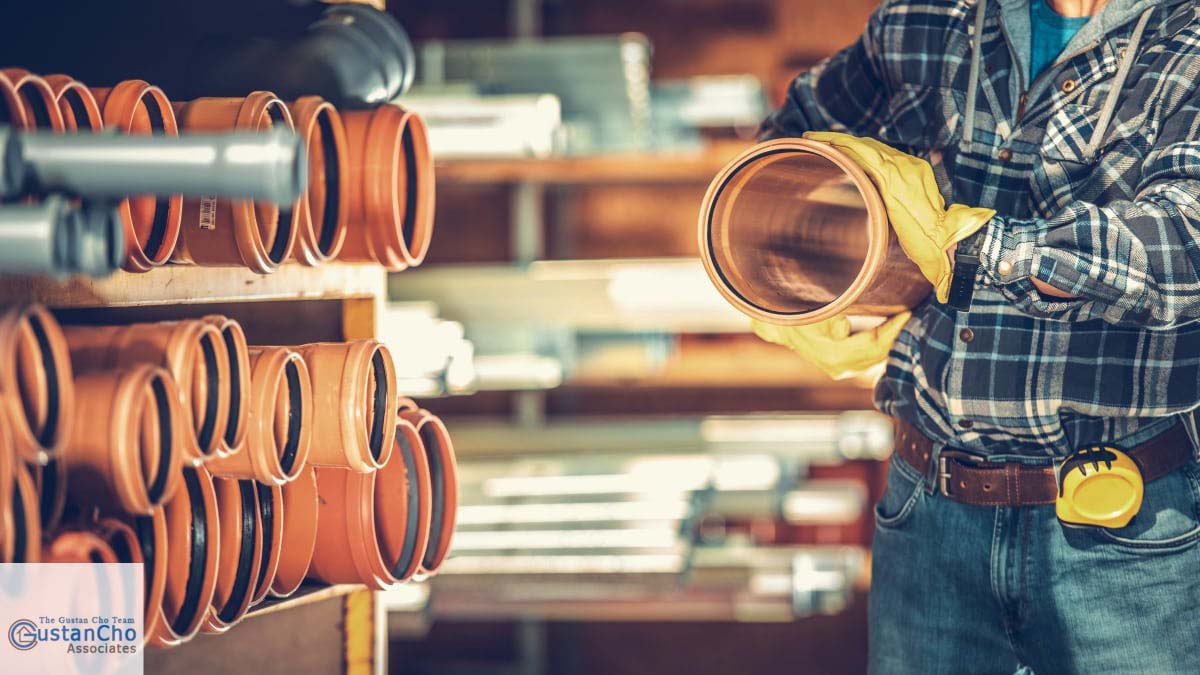Buying a house is a big deal, and there’s a lot you need to check to make sure you’re making a smart choice. One important thing to look at is septic inspections on home purchases. This is especially important if the house has its own system for dealing with wastewater. This guide is here to show you why checking the septic system is key when you’re buying a house. We will show you what happens during the check, and what to do if any problems pop up.
Why Septic Inspections on Home Purchases Are Important
When buying a house, it’s important to check that everything works well. And the septic system is included. Here’s why septic inspections on home purchases matter:
- Avoid Surprise Bills: Catching problems early can help you avoid spending a lot on fixing stuff later.
- Stay Healthy and Safe: A bad septic system can make your drinking water unsafe and cause illness.
- Protect the Environment: When septic systems work properly, they don’t pollute the groundwater or nearby lakes and rivers.
- Follow the Rules: Ensuring the septic meets local health rules means you won’t get into legal trouble
Concerned About Septic Systems? Let’s Ensure Your New Home Is Ready!
Contact us today to schedule a professional septic inspection and avoid costly surprises after your home purchase.
Common Issues Found During Septic Inspections
When buying a home, it’s smart to check the septic system for these common problems during the septic inspections:
Tree Roots: Sometimes, tree roots grow into the septic tank, causing it to leak or become blocked. Inspectors watch out for this to prevent future troubles.
Shifting Ground: If the earth moves around, it can push on the septic tank. This might mean you must clean it out more often, or it could get damaged.
Heavy Machinery: In the countryside, big vehicles driving over where the septic system is can harm it. Inspectors keep an eye out for signs of this kind of wear.
Pipe Problems: Special pipes ensure that only the stuff that’s supposed to get into the drain field does. If these are broken, it could cause big issues.
Water Pressure from the Ground: A lot of water in the ground can push the septic tank up and mess up the draining part.
Old Systems: Some septic systems are just old and don’t work as well as newer ones. Inspectors look at whether they’re still doing their job right.
The Septic Inspection Process
When buying a house, septic inspections are key to ensure everything’s working right. Here’s a simple breakdown of what happens:
- Looking Back: The person checking your septic system starts by looking at the house’s records and any past issues with the septic.
- Finding the Parts: They determine the location of the septic tank and the area that absorbs the wastewater (drain field).
- Checking the Tank: The inspector looks at the septic tank closely to see any damage, leaks, or how much sludge is inside.
- Drain Field Check: They ensure that the area that absorbs the wastewater is doing its job properly.
- Looking at Everything: The inspector also checks the septic system’s components, such as pipes and filters, to see if they’re in good shape.
- Flow Test: Water is run through the system to ensure it moves and drains properly.
- The Final Word: After everything, you get a detailed report that tells you what they found and if you need to fix or maintain anything.
That’s the rundown on what happens in septic inspections on home purchases. It’s all about making sure you won’t have any surprises with the septic system after you move in.
What Homebuyers Should Do
As a homebuyer, you should:
- Get a Good Inspector: Make sure they know their stuff, especially for septic inspections when buying a home.
- Be There for the Check-Up: This way, you can see what they see and ask questions.
- Read the Report Well: Know what’s in it and what it means for the house.
- Talk About What You Find: Use what the report says to talk about fixing things or lowering the price with the person selling the house.
Addressing Septic System Issues
Don’t freak out when you’re buying a home and septic inspections show some problems. Here’s a simple guide on what to do:
- Understand the Issue: First, get what’s wrong in plain language from the inspector.
- Get Repair Estimates: Then, find out how much it’ll cost to fix by asking for prices from reliable repair folks.
- Negotiate with the Seller: If there are issues, talk to the seller. Make sure they can handle the repairs or lower the price so you can take care of it.
- Plan for Future Maintenance: Lastly, remember to keep up with septic system checks and upkeep to avoid future headaches.
Buying a Home with a Septic System? Make Sure It’s in Good Condition!
Reach out now to arrange for a septic inspection and ensure the system is functioning properly before you buy.
Keep Your Home’s Septic System in Good Shape
Looking after your home’s septic system doesn’t have to be hard. Just remember these easy steps:
- Check-Ups: Get your septic system checked every 3-5 years. This is especially important if you’re thinking about buying a home. Always include septic inspections on home purchases to avoid surprises later.
- Cleaning: Pump out your septic tank once in a while to stop it from getting too full of waste.
- Save Water: Use water wisely so you don’t overload your septic system.
- Proper Waste Disposal: Only flush things that break down easily. Never dump harmful chemicals in your sink or toilet.
- Protect the Area: Do not drive over or plant trees near the septic system’s drain field.
Environmental and Health Considerations
A broken septic system is bad news for the environment and can make people sick:
- Water Contamination: It can mess up the water underground, which isn’t safe for anyone.
- Spread of Diseases: If the wastewater isn’t cleaned properly, it can spread diseases.
- Legal Consequences: If you don’t follow the rules for septic systems, you might have to pay fines or deal with other legal troubles.
Ensuring your septic system works right, you keep your family healthy and look after nature, too. Remember to check the septic system when buying a house to avoid these problems.
Investing in a Home with a Septic System
Buying a house with a septic tank may be scary, but these systems can last long if you take good care of them. When you’re looking at homes with septic tanks, remember a few simple things:
- Age of the System: Older tanks might need more fixing or even need to be replaced.
- Usage History: Knowing what it’s been through can help spot future problems.
- Inspection History: If it’s been checked regularly, it’s likely been kept in good shape.
Remember, getting septic inspections on a home purchase is a smart step to help you understand what you’re getting into.
Final Thoughts
Checking the septic system when buying a house is super important to make sure your new place is a smart buy. It’s all about knowing how crucial these checks are, what goes on during them, and how to deal with any problems. This way, you can be sure about your house-buying choice. Remember, a good septic system keeps you healthy. It helps the environment and keeps your home’s value up over time.
By keeping up to speed and taking action early, you can get the most out of buying your house and avoid any bad surprises later. Always make sure to get those septic inspections on home purchases done. It’s a smart move to protect your money and enjoy peace of mind in your new space.
FAQs: The Ultimate Guide to Septic Inspections on Home Purchase
- 1. Why are septic inspections on home purchases important? Septic inspections are crucial to ensure the system works properly, avoid unexpected repair costs, and ensure the health and safety of your family.
- 2. What do septic inspections on home purchases typically check for? They check for tree roots, shifting ground, heavy machinery damage, pipe problems, groundwater pressure, and the condition of older systems.
- 3. How often should a septic system be inspected? It’s recommended to have a septic system inspected every 3-5 years, especially before buying a home.
- 4. Can I be present during the septic inspection? Yes, being present allows you to ask questions and better understand the condition of the septic system.
- 5. What should I do if the septic inspection reveals problems? First, understand the issue, get repair estimates, negotiate with the seller, and plan for future maintenance to keep the system in good shape.
- 6. How can I find a qualified septic inspector? Look for certified and experienced inspectors, often recommended by your realtor or local health department.
- 7. What are common signs of septic system issues? Signs include slow drains, bad odors, wet spots in the yard, and lush green grass over the drain field.
- 8. Can septic inspections on home purchases affect the sale price? The results of the inspection can be used to bargain repairs or a reduced sale price with the seller.
- 9. What maintenance does a septic system require after buying a home? Key maintenance tasks include regular pumping, water conservation, proper waste disposal, and protecting the drain field.
- 10. How do septic inspections on home purchases protect the environment? They ensure the system doesn’t pollute groundwater or nearby water bodies, helping to maintain a healthy environment.
If you have any questions about Septic Inspections on Home Purchase, please contact us at 800-900-8569. Text us for a faster response. Or email us at alex@gustancho.com. The team at Gustan Cho Associates is available 7 days a week, on evenings, weekends, and holidays.
This blog about The Ultimate Guide to Septic Inspections on Home Purchase was updated on July 30th, 2024.
Want to Ensure Your Septic System Is Safe? Let Us Handle the Inspection!
Reach out now to schedule a septic inspection and ensure your new home is ready for move-in.











It really helped when Michelle McCue talked about the importance of checking the septic system of a house before its purchase. Recently, my wife and I started to look for a house to buy. We found the one we absolutely love, but we want to make sure it’s in good shape before we buy it, so we’ll be sure to follow your tips. Thanks for the advice on septic tank inspection and how it’s a must for any house transaction. Like to thank the team at Gustan Cho Associates for being so diligent in educating the public in mortgages.
My cousin Steph noticed that her septic tank is already clogged, which is why she would like to have it pumped right away. Well, thank you for sharing here that a tree root can sometimes affect the tank’s condition beneath. Anyhow, I will keep in mind to tell her that she must never park a heavy car on top of the tank too. You should never have anything heavy sitting on a septic tank area. I like to thank the team at Gustan Cho Associates for the great informative blogs and videos.
You made a good point when you shared that it is important to install a septic tank properly by hiring the right company to do so. Great blog post by Gustan Cho Associates. My uncle just mentioned the other day that he is planning to move to a new house next month but it does not have a water line system. I will suggest to her getting a septic tank from a reliable supplier to be installed for his new home. Like to thank the staff at Gustan Cho Associates for such informative information.
It was really interesting when the article pointed out that it is important for people to keep an eye on septic drain fields because they don’t last forever. Would it be a good idea to have a drain field inspected at least once a year by a professional service? It seems like an inspection would be the best way to identify when a drain field needs maintenance. Carolyn Warren referred me to you in reference to purchasing a home here in Charlotte, NC. I have some credit challenges and my scores when last I checked were in the low 600’s.
One of the main issues is I have a car repossession in 2018 with a balance of $ 9000 approximately. I’ve been told to pay it off and not pay it off-not sure what to do. From the credit reports I’ve seen I cannot determine if it is a collection, charge-off or judgement.
My goal is to come up with a plan going forward and what I need to do over the next 3,6, 12 months in order to purchase a home.
Great job and rental history-at current job since 10/2018 and rental history (7 years). No debt besides car payment, Student loan-in forebearance-and credit cards which I pay off in full each month and try to keep usage below 30-35%. I have $ 22,000 in checking and savings toward a home purchase.
I had no clue that the ground level around the septic tank could change. I still want to get a septic tank though. Maybe I can get whoever installs it for me to come inspect it every once in a while. My wife and I have bad credit, around 535 FICO, and several accounts in collection/charge off. Also have a couple open judgements. However, our income has improved substantially since defaults (all around 2017-2018 due to job loss). Annual income from employment is now $95,000/year. We currently rent a single family house and the owner wants to sell, so either we buy it, or we must move out in 60 days. Can you help us get a mortgage to buy the house that we have rented for 10 years?
While buying a house, this is definitely something a lot of people would ignore. It was really great that you put this point out here are important, you don’t want to end up with a house that doesn’t have a well-maintained septic tank.
I thought it was interesting when the article mentioned that septic tanks need to be emptied at least once every three years. If the septic tank isn’t emptied, I would imagine that you could start dealing with overflowing and other issues. Overflowing seems like a bad problem to have because it could cause a lot of damage. I am not 62, has rules changed since 2019 regarding assets in the name of borrower needing to be 62?
Had 4 late payments in March 2021. Health/COVID reasons and just was not a le to pay(not due to revenue).
Paying down credit cards and will be completely paid off my Aug 30th. We did have a high ratio to limit.
Mortgage score was 543 a th My Fico (625 experian) one month of paying down $2,000 score raised to 556. Expect next month to be higher.
Is there any way to get around the late payments? Relocating for work and need to purchase a home in the next month or two.